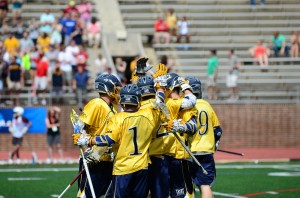 This past season, the Drexel men’s lacrosse team went further than it had ever gone before. The Dragons clinched their first NCAA tournament berth with a Colonial Athletic Association Championship and would go even further, winning their first NCAA tournament game ever over the University of Pennsylvania Quakers.
This past season, the Drexel men’s lacrosse team went further than it had ever gone before. The Dragons clinched their first NCAA tournament berth with a Colonial Athletic Association Championship and would go even further, winning their first NCAA tournament game ever over the University of Pennsylvania Quakers.
This summer, the team once again pushed the boundaries of how far it could go, but this time the distance was measured in miles, not accomplishments.
During a week spanning late June and early July, the Dragons took on the Japanese national team and other assorted challengers in Tokyo during the Friendship Games, an international clinic embracing international friendship through the sport of lacrosse.
The Dragons departed June 27 for Tokyo, with the meeting with the Japanese national team scheduled for June 29. But Brian Voelker, head coach of the Dragons, made it known that the trip was much more about the experience for the players than it was about actual playing experience.
“We didn’t really go over there to get better as a lacrosse team,” Voelker said upon returning from the trip. “[It was] more an opportunity to give the kids a great experience. We didn’t even practice or workout before the games; we just took them and let them play. It was much more about the cultural experience for us.”
Exemplifying this cultural experience was the fact that Voelker and a few players got to meet with Japan’s Princess Takamado before the game as part of a large-scale opening ceremony at Edogawa Stadium.
While playing lacrosse wasn’t the focus, the team played well in its matchups. The main matchup of the weekend was the game against the Japanese men’s national team, a team that intends to compete at the World Games this year and could be competitive.
In the game, rising sophomore forward Cole Shafer led the Dragons to an 11-7 victory over Japan, scoring four goals and garnering MVP honors in the process.
The Japanese team kept the game close all afternoon, staying within three goals until the tail end of the final quarter. The game was halted midway through the third quarter due to inclement weather, but the cloudy skies did little to deter either offense.
Following the victory, Voelker and Shafer spoke to the media, which Voelker described as informal speeches. In their speeches, both Voelker and Shafer made sure to thank Japan for their efforts in welcoming the team and hosting them.
This was the main event of the weekend, but the team also played in a few scrimmages against local universities in Tokyo.
Against the University of Tokyo, the Dragons prevailed 12-3. They followed that up by defeating Waseda University in a back-and-forth contest that ended with a final score of 6-4. The following game, against Meiji University, the Dragons started to show their fatigue but nonetheless pulled out a victory, 5-1.
In the finals competition of the day, the Dragons downed Hosei University, 5-3, finishing the weekend undefeated. Voelker was impressed by the team’s performance, especially considering they had little preparation before it.
“The scrimmages were solid, everyone played, and they all played up to expectations. We beat their national team, which we were expecting to do, and they all played hard and gave a good show for the crowd there,” Voelker said. “Most importantly, we put some players into new roles that they weren’t used to, and they were impressive.”
The competition was somewhat stiff, but really the weekend exposed a great disparity between the skill of the Japanese side and that of the Dragons. But Voelker wasn’t focused on vaunting his team’s success; instead, the head coach talked about how important events like these are for the well being of lacrosse as a global sport.
“I think that there’s a huge push to make lacrosse an Olympic sport, and we need more countries to be more serious about it in order to accomplish that,” Voelker explained. “Japan has only had a program for around 30 years and they’re improving, but the rest of the world has a long way to go before they can be competitive. Canada and the United States are the only winners of the World Games, and other teams have been working hard to compete. I played on the U.S. team twice, and it’s an incredible honor to play for your country. Making it an Olympic sport would be incredible, and this is a huge step.”


